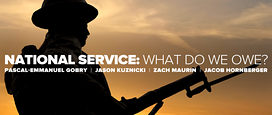I’m confused: why do Jacob Hornberger and others from the libertarian camp so often think that civilian national service serves the state? (Whatever is meant by the “state.”)
These arguments often make me think they view national service as a state takeover of the individual – that some government official is going to pick you up in an unmarked van in the dark of night, drive you to an unknown destination, put you in a government uniform, and then brainwash you so you’ll dutifully serve the state. For the record, I’d be against that too.
Fortunately, that is not at all how our modern day national service programs work. Or anything close to that. Perhaps the combination of the words “national” and “service” are the issue. What if we called it a “year of charity to your community”? That’s what most of us national service advocates are asking for, and that’s what exists today.
The biggest national service program, AmeriCorps, is a government agency that makes grants to private nonprofits that want to support young people in a term of service with their organizations. The host organization such as Habitat for Humanity, Montana Conservation Corps, or thousands of others, then have to match the AmeriCorps dollars (that is, taxpayer money) with non-federal funds.
When serving with these organizations you work for them, at their direction – not for the government. (Though in the words of Jerry Seinfeld, “Not that there’s anything wrong with that.”)
In Hornberger’s latest piece he talks about the voluntary donations to one’s church. There’s a request, but no expectation to give, and no consequence if you don’t. That’s exactly how national service works and what I’m advocating for. Political leaders, community leaders, church leaders, teachers, parents, and friends should ask – not require – young people to serve a year to their community to help others.
The work they do – mentoring struggling students so they pass their classes, helping families rebuild after floods, and working with the elderly to live independently – will help more Americans live more freely. Isn’t that what Hornberger and libertarians want?

